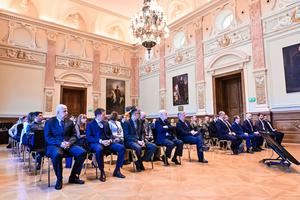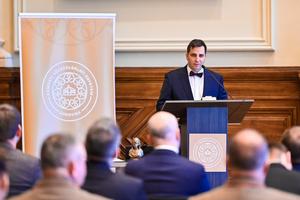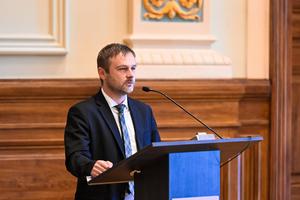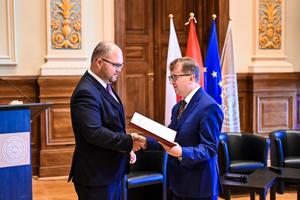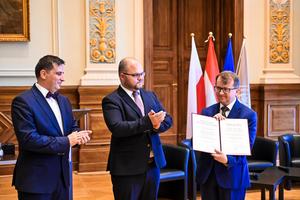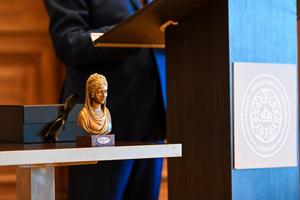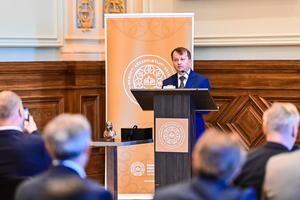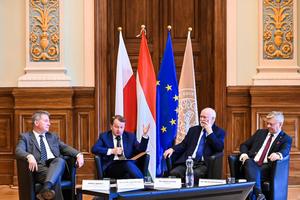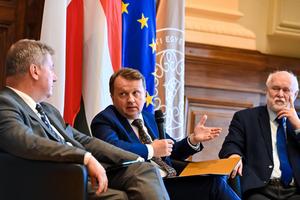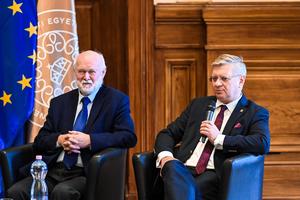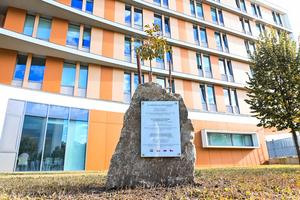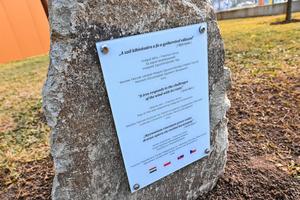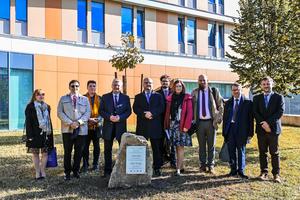With the intention of establishing a tradition, the Ludovika Prize was awarded for the first time at the Ludovika University of Public Service (LUPS) on November 6. The award went to Stanisław Sroka, dean of the Faculty of History at Jagiellonian University in Krakow.
"Follow the path that no one has traveled before and leave the trail that others will follow" – quoted Deli Gergely in his welcome speech. The rector of LUPS reminded that the Ludovika Prize is the recognition of individuals whose performance, excellence in scientific-public-professional fields, knowledge, and life path are exemplary. He emphasized that when the Senate of LUPS established the award earlier this summer, it was determined as a priority to award it to highly esteemed and internationally recognized individuals whose activities serve the cause of the "Central European thought," and the interests of Hungary and the Central European region.
The rector spoke about the mission of LUPS, which is to preserve and pass on the traditions of Ludovika Academy along the values of loyalty, duty, courage, discipline, comradeship, and the significant role of knowledge in serving the country. He pointed out that since its foundation, the university has aimed to gather all those who consider Hungary and its immediate surroundings, Central Europe, important. He recalled that LUPS has institutional Erasmus+ agreements with nearly twenty Polish partners, and it collaborates with six other Polish institutions. He mentioned that this summer, the university, in collaboration with the Wacław Felczak Polish-Hungarian Cooperation Institute, organized the Visegrad Summer Academy. Also, a free Polish language course, jointly organized with the Felczak Institute, is underway, with over fifty participants already enrolled.
The first recipient of the Ludovika Prize is Professor Stanisław Sroka, dean of the Faculty of History at Jagiellonian University in Krakow, a specialist in the destiny of Central Europe. His significant academic work was praised by Mitrovits Miklós, scientific researcher at the József Eötvös Research Center for Central European Studies of LUPS.
"Professor Sroka's life path, professional work, and his work on mutual understanding of Hungarian and Polish culture and history are exemplary for the present and future generations," said the researcher. He recounted that Stanisław Sroka began to learn Hungarian by attending the classes of the Hungarian department in the late 1980s, and later improved his knowledge in Hungary as an Eötvös Scholarship holder. In 1991, he obtained a degree in history, with his main research area being the history of Central Europe, with a particular focus on Hungarian-Polish historical relations and genealogy. He emphasized that Stanisław Sroka, whose work is recognized not only in his home country but also in Hungary (he received the Cross of Merit of the Republic of Hungary in 2014), conducted significant source research and wrote several monographs.
The Ludovika Prize includes a certificate, a bust of Maria Ludovika of Austria, and $5,000. Following the award ceremony, a panel discussion was held, moderated by Gergely Prőhle, Director of the Institute of Strategic Studies at the university. Participants discussed various topics, including Hungarian-Polish historical relations.
"They [Poles] welcomed us with such love, as if we were the descendants of the heroes of 1956," recalled historian and former consul in Krakow, István Kovács. He talked about the political situation in Hungary and Poland in the 1980s, emphasizing the support of the Poles for Hungarian refugees. According to Kovács, traveling to Poland in the 1960s was like traveling to the West. Polish was learned by many members of the "hitchhiking generation" because of this. The courage, openness, sincerity, and trust of the Poles had a great impact on them, he said.
In the Katowice gymnasium, Latin would have been part of the curriculum, but due to a teacher, he decided to transfer to the Hungarian group instead – recalled Maciej Szymanowski, the director of the Wacław Felczak Polish-Hungarian Cooperation Institute. He spoke, among other things, about the political situation in Hungary and Poland in the 1980s. He mentioned that his best friend is Hungarian and highlighted the helpfulness of his fellow countrymen.
As a student, the idea of researching Central European history emerged in him, so he learned Hungarian, Czech, and Slovak to fulfill that goal, recalled Stanisław Sroka. He emphasized the need to focus on the education of young generations, student exchange programs, and learning each other's languages to ensure that Hungarian-Polish relations resemble the good relations of the Middle Ages. The first recipient of the Ludovika Prize also spoke about the importance of building connections with Central European countries in the current political context.
At the end of the event, a memorial stone symbolizing the Visegrád Four (V4) was inaugurated in front of the Orczy Road Dormitory, next to the tree of Hungarian-Polish friendship, brought from the Visegrád Mountains to the Ludovika Campus. An inscription plaque was also placed on the memorial stone.
Text: Szabó Réka Zsuzsanna
Photo: Szilágyi Dénes

